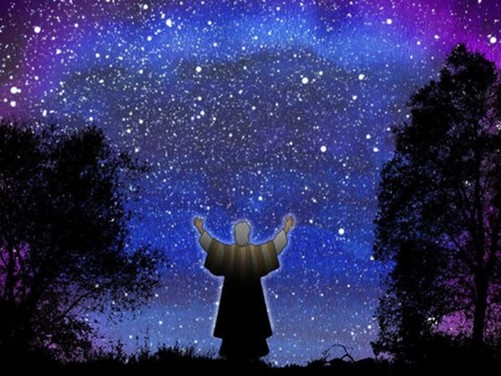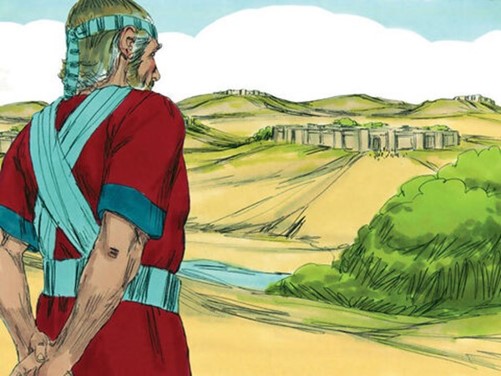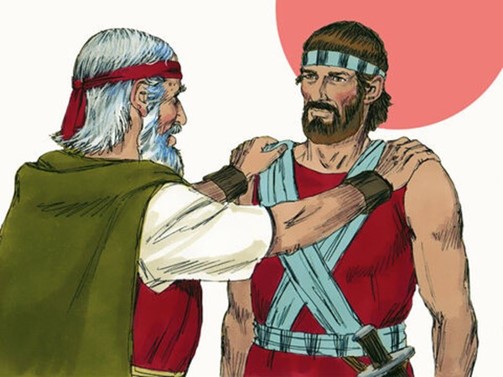Good morning!
Greetings in the name of the Father, the son, and the Holy Spirit.
Then the Lord appeared to Abram and said, ‘To your offspring I will give this land.’ So he built there an altar to the Lord, who had appeared to him. (Genesis 12:7)

In the vast tapestry of ancient narratives, there lies a particularly compelling story of divine promise, human perseverance, and ultimate fulfillment. Picture a sprawling landscape, ripe with potential and promise—a land flowing with milk and honey, destined to be a new home for a nomadic tribe. This is the backdrop as we delve into the chapters of Joshua 13-14, where we find a pivotal moment in the annals of a people chosen by God. Here, after decades of wandering in harsh deserts, after battles fought and won against seemingly insurmountable odds, the tribes of Israel stand on the brink of a new era.
This moment is not merely about the physical allocation of territories or the logistical considerations of settling a nomadic people. Rather, it is a profound manifestation of faithfulness where the divine promise made to their forefathers—Abraham, Isaac, and Jacob—is seen coming to fruition. The division of the promised land among the tribes of Israel represents a significant covenantal milestone, a testament to a trust that spans generations, binding the divine to His people through tangible, earth-bound signs of commitment.
As we explore this crucial event, we are not just observers of a historical transaction; we are witnesses to a sacred act of divine fidelity. This story is a powerful reminder of how deeply intertwined the concepts of faith, promise, and land are in the narrative of God’s people. It invites us to reflect on the nature of promises—both human and divine—and challenges us to consider our own responses to the fulfillments and delays of such promises in our lives.

The Promise Kept
As the Israelites stood upon the fertile soil of Canaan, the vast expanse before them was not merely a geographic locale—it was a vivid symbol of divine faithfulness materializing before their eyes. This was the land that generations of their ancestors had dreamed of, a land promised to Abraham when God declared, “To your offspring I will give this land” (Genesis 12:7). Now, under the resolute leadership of Joshua, this ancient promise was unfolding into reality. This pivotal moment marked not only a new chapter for the Israelites but also the culmination of a divine assurance that spanned centuries.
The scripture vividly narrates this scene: “Joshua cast lots for them in Shiloh before the Lord, and there Joshua divided the land to the Israelites according to their tribal divisions” (Joshua 18:10). This method of distributing the land, through casting lots, was not left to human’s decision; it was a deeply spiritual act perceived to be guided by the hand of God. Each allotment was seen as ordained by divine will, ensuring that every tribe received its rightful inheritance. This process underscored the meticulous care with which God attended to the details of His promises, fulfilling His word not just in broad strokes but in specific allocations, allowing each tribe to establish its identity and destiny within the promised landscape.
This act of dividing the land was highly symbolic and carried profound significance. It was a tangible manifestation of God’s unwavering commitment to His covenant. Each tribe’s receipt of their portion of the land was a powerful testament to the reliability of God’s word. It demonstrated that what He promises, He delivers, reinforcing the scriptural truth that “Not one of all the Lord’s good promises to Israel failed; every one was fulfilled” (Joshua 21:45).
Furthermore, the division of Canaan among the tribes was not merely about fulfilling a historical promise; it was also about establishing a framework for the future. It laid the foundation for the societal structure, economic sustainability, and continued religious observance among the Israelites. By settling the land according to divine direction, the tribes could not only claim their heritage but also begin to live out their unique roles within the collective story of God’s people. It allowed them to transition from a nomadic existence defined by temporary shelters and transient waypoints to a settled life where communities could thrive, temples could be built, and a nation could be established.
The fulfillment of this promise also reinforced the Israelites’ trust in God’s provision and protection. As they took possession of the land, facing various challenges including the presence of remaining hostile groups and the task of building a new society, their faith was continually refined. The physical inheritance of the land was paralleled by a spiritual deepening, a growing understanding that their relationship with God was the true cornerstone of their identity and security.
In this historic moment, we see a powerful illustration of how God’s promises are interwoven with our active participation. While it is God who grants the inheritance, it is up to His people to take possession of it, to steward it responsibly, and to honor the divine purpose in their daily living. This dual dynamic of divine promise and human responsibility continues to speak to us today, reminding us that our spiritual inheritances require not only faith to receive but also commitment to act upon.
In summary, the distribution of the land to the Israelites under Joshua’s leadership encapsulates a broader narrative of promise, faithfulness, and fulfillment. It invites us to reflect on the promises we have received from God and challenges us to consider how we are living out those promises in our own lives, fostering a deeper trust in the One who is faithful to complete what He has begun.

The Role of Leadership and Obedience
Joshua’s leadership during the historic moment of dividing the land among the tribes of Israel highlights a model of leadership steeped in humility and obedience to divine command. Unlike many leaders who are driven by personal ambition, Joshua’s actions were characterized by a steadfast dedication to the divine plan laid out by God through Moses. This transition from the Moses to Joshua was not just a change in leadership but a continuation of a divine promise, showing how godly leadership is crucial in the fulfillment of God’s plans. Joshua exemplifies this through his adherence to the commands given to him, as Moses instructed: “Be strong and courageous, for you will bring the Israelites into the land I promised them on oath, and I myself will be with you” (Deuteronomy 31:23).
This commitment to divine guidance is further evident in the process used to allocate the land among the tribes—casting lots. This method was perceived not as leaving their fate to chance but as seeking God’s will in the distribution process. The practice of casting lots, as stated in Proverbs 16:33, “The lot is cast into the lap, but its every decision is from the LORD,” reinforces the belief that when significant decisions are made, they should be entrusted to divine providence to prevent human bias and ensure fairness. Joshua’s reliance on this method was a testament to his desire to see the land divided not by human wisdom or preference but by the impartial and just hand of God.
Joshua’s leadership and the method of casting lots teach us valuable lessons about the essence of godly leadership and decision-making. Leadership, especially in a community or spiritual context, requires more than just administrative skills or charisma; it demands a deep connection to divine direction and an unwavering commitment to act according to that guidance. This approach not only leads to decisions that are just and equitable but also fosters a sense of unity and harmony within the community. It shows that true leadership is about facilitating the common good based on a moral and spiritual foundation.
Moreover, Joshua’s approach encourages today’s leaders to seek God’s guidance in their decision-making processes, especially when the outcomes have far-reaching implications for their communities. It underscores the importance of submitting personal and organizational plans to God’s will, ensuring that actions taken are aligned with a higher purpose and moral direction.
The distribution of the land under Joshua’s leadership was not just an administrative task but a fulfillment of a covenant promise, making it a deeply spiritual act that affirmed God’s faithfulness to His people. It served as a powerful demonstration of how human obedience in leadership, combined with divine guidance, can result in the realization of God’s promises. This scenario illustrates that when leaders operate under God’s guidance, their actions can bring about significant spiritual and communal benefits, reinforcing the principle that godly leadership is a conduit for divine blessings.
In conclusion, Joshua’s role in the distribution of the Canaan land is a profound reminder of the impact of leadership that is rooted in obedience to God. It challenges all who lead—in whatever capacity—to consider how their decisions and actions align with divine will and to strive for outcomes that reflect not just human intentions but God’s righteous and perfect plan for His people.

The Inheritance of Faith
The distribution of the Promised Land as recounted in the book of Joshua was not merely a divine allotment but a call to action for the tribes of Israel. Each tribe, upon receiving their designated portion of land, was charged with the responsibility to actively take possession of it. This required not just a physical claiming but a moral and spiritual readiness to embrace and steward the land as their heritage. This act of possession is emblematic of a deeper spiritual truth that resonates across time: God promises us a spiritual inheritance, but it is incumbent upon us to take proactive steps to claim and integrate it into our lives.
The biblical narrative vividly illustrates this dynamic through the story of Caleb, an exemplar of faith and tenacity. Despite being 85 years old at the time of the land distribution, Caleb’s vigor and commitment to God’s promises had not waned. He stood before Joshua and declared, “Now give me this hill country that the Lord promised me that day. You yourself heard then that the Anakites were there and their cities were large and fortified, but, the Lord helping me, I will drive them out just as he said” (Joshua 14:12). Caleb’s assertion is not merely a request for territory but a declaration of faith. His readiness to confront the challenges of the Anakites stemmed from his unwavering belief in God’s promise and his commitment to act upon it.
Caleb’s narrative is a powerful reminder that our spiritual inheritance is not passively received. It requires active faith, courage, and initiative. This principle is further emphasized in the New Testament, where the Apostle Paul speaks of a “heavenly inheritance” (Ephesians 1:18) that is secured for us through Christ. Like the physical land that needed to be actively possessed by the Israelites, our spiritual blessings in Christ need to be actively pursued and integrated into our daily lives.
This concept of actively claiming our inheritance challenges us to consider our own spiritual journey. Are we like Caleb, ready to claim what has been promised, regardless of the obstacles? Or do we shy away from the challenges, thereby forfeiting the fullness of our spiritual potential? The distribution of the land in Joshua serves as a metaphor for the spiritual conquests we are called to undertake. Each believer is tasked with the responsibility to “take hold of” that for which Christ Jesus took hold of us, as Paul writes in Philippians 3:12.
Not that I have already attained,[a] or am already perfected; but I press on, that I may lay hold of that for which Christ Jesus has also laid hold of me. (Philippians 3:12)
Moreover, the act of taking possession of the land underscores a communal aspect of spiritual inheritance. Just as the land was to be a place where the community of Israel could flourish, our spiritual inheritance is intended to enrich not only our individual lives but also to contribute to the growth and edification of the broader faith community. This is reflected in how the early church lived out their faith, “All the believers were together and had everything in common. They sold property and possessions to give to anyone who had need” (Acts 2:44-45), illustrating the communal impact of shared spiritual blessings.
In conclusion, the distribution of the Promised Land to the tribes of Israel and the individual responsibility to claim and cultivate that land serves as a profound allegory for our spiritual lives. It compels us to actively engage with our faith, to confront obstacles with courage, and to lay claim to the promises of God with unwavering determination. Let us be inspired by Caleb’s example to not only receive our inheritance with gratitude but to pursue it with the fullness of our faith, knowing that in doing so, we are fulfilling our divine destiny and contributing to the kingdom of God.
Summary: Lessons from the Land
The division of Canaan among the tribes of Israel, as recounted in the book of Joshua, transcends its historical significance to impart profound spiritual lessons that resonate through time. This narrative vividly demonstrates the certainty of God’s promises, as each tribe receives a specific portion of the land, fulfilling the ancient promise made to Abraham, Isaac, and Jacob. This act of fulfillment serves as a powerful testament to the unwavering faithfulness of God, affirming that what He commits to, He will surely bring to pass.
Moreover, the story underscores the crucial role of leadership and obedience in the realization of God’s promises. Joshua’s leadership, characterized by faith, obedience, and a deep respect for divine commands, was pivotal in transitioning the Israelites from nomadic wanderers to a settled people with a land to call their own. His adherence to God’s directives ensured that the distribution was carried out equitably and justly, setting a standard for how leadership should function within the parameters of God’s will. This emphasizes that true leadership is not about exerting power but about guiding people in the path that God has laid out, ensuring that His purposes are fulfilled through steadfast obedience.
Additionally, the narrative highlights the active role each tribe and individual must play in claiming their inheritance. The land was allocated, but it required the tribes to take possession of it, to inhabit and cultivate it, mirroring the spiritual action required of us today. We are reminded that the blessings and promises of God, while freely given, require our active participation and commitment. They compel us to step out in faith, to take hold of what has been promised by engaging fully with the opportunities and challenges presented to us.
These lessons prompt us to introspectively reflect on our own spiritual journeys: Are we placing unwavering trust in the promises of God? Are we seeking His guidance in every decision and aligning our actions with His divine will? Are we actively engaging in claiming the spiritual inheritance set before us through prayer, obedience, and faith-driven action?
As we contemplate these questions, we are encouraged to emulate the faith of Joshua and the Israelites. Their story inspires us to pursue our divine inheritance with a proactive faith, assured that God’s promises are sure and His guidance is available to those who seek it earnestly. In doing so, we not only secure our spiritual legacy but also contribute to the broader narrative of God’s kingdom, marked by faith, obedience, and the collective fulfillment of His divine promises.
Let’s pray together. Heavenly Father, thank You for the lessons we learn from Your faithfulness to Israel. Help us to trust in Your promises as they did, to seek Your guidance in every decision, and to actively pursue the spiritual inheritance You have prepared for us. May we walk in obedience and faith, just as Joshua and Caleb did, and may we experience the fulfillment of Your promises in our lives.
Amen.

Not one of all the Lord’s good promises to the house of Israel failed; every one was fulfilled. (Joshua 21:45)
